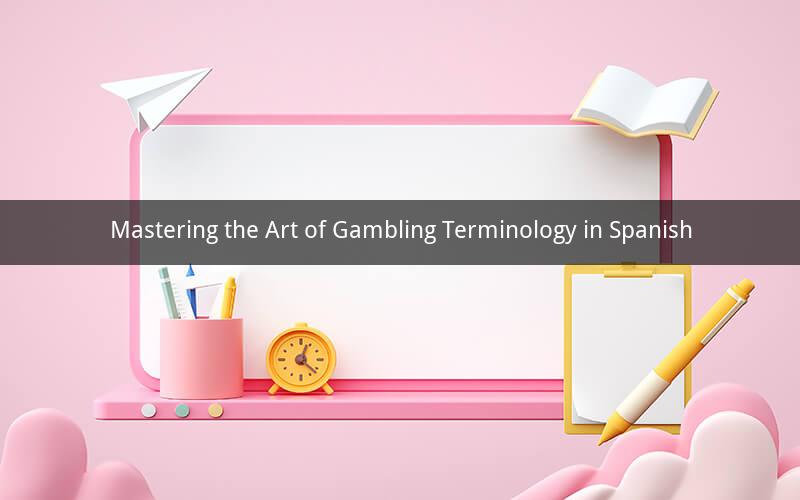
Introduction:
Gambling is a popular pastime around the world, and Spanish speakers often find themselves in situations where they need to discuss this activity. Whether you're traveling to a Spanish-speaking country, engaging in a conversation with a Spanish-speaking friend, or simply want to expand your vocabulary, learning how to say gambling-related terms in Spanish is essential. In this article, we will explore various gambling terms and provide you with practical examples of how to use them in a conversation.
1. Jugar (To Play)
The term "jugar" is the Spanish equivalent of "to play." It is a fundamental word when discussing gambling activities. For instance, you can say "estoy jugando al poker" (I am playing poker) or "me gustaría jugar a la ruleta" (I would like to play roulette).
2. Apuesta (Bet)
"Apuesta" is the Spanish word for "bet." This term is commonly used when discussing placing a wager on a game. For example, "hizo una apuesta de $100" (He made a $100 bet) or "quiero hacer una apuesta en la lotería" (I want to make a bet on the lottery).
3. Casino
The word "casino" is used to refer to a gambling establishment. In Spanish, it remains the same. You can say "fuimos al casino" (We went to the casino) or "queremos visitar un casino" (We want to visit a casino).
4. Juego (Game)
"Juego" is the Spanish word for "game." This term is often used when discussing different types of gambling games. For example, "me encanta jugar a los juegos de azar" (I love playing gambling games) or "estoy aprendiendo a jugar al blackjack" (I am learning to play blackjack).
5. Sorteo (Lottery)
"Sorteo" is the Spanish word for "lottery." It is commonly used when referring to a game where participants buy tickets for a chance to win a prize. You can say "participé en un sorteo" (I participated in a lottery) or "me gustaría jugar la lotería" (I would like to play the lottery).
6. Mano (Hand)
"Mano" is the Spanish word for "hand." It is often used in card games, such as poker or blackjack. For instance, "mi mano es fuerte" (My hand is strong) or "estoy esperando mi mano" (I am waiting for my hand).
7. Carta (Card)
"Carta" is the Spanish word for "card." This term is essential when discussing card games. You can say "me di una carta" (I dealt a card) or "la carta que te di es una reina" (The card I gave you is a queen).
8. Ganar (To Win)
"Ganar" is the Spanish word for "to win." It is commonly used when discussing the outcome of a gambling game. For example, "gané la apuesta" (I won the bet) or "me gustaría ganar el sorteo" (I would like to win the lottery).
9. Perder (To Lose)
"Perder" is the Spanish word for "to lose." This term is essential when discussing the negative outcome of a gambling game. You can say "perdí la apuesta" (I lost the bet) or "no quise perder el dinero" (I didn't want to lose the money).
10. Baccarat
"Baccarat" is a popular card game that is also widely played in Spanish-speaking countries. You can say "estoy aprendiendo a jugar al baccarat" (I am learning to play baccarat) or "me gustaría probar el baccarat" (I would like to try baccarat).
Questions and Answers:
1. Q: How do you say "I love playing poker" in Spanish?
A: You can say "Me encanta jugar al poker."
2. Q: What is the Spanish word for "bet"?
A: The Spanish word for "bet" is "apuesta."
3. Q: How do you say "I lost the bet" in Spanish?
A: You can say "Perdí la apuesta."
4. Q: What is the Spanish word for "card"?
A: The Spanish word for "card" is "carta."
5. Q: How do you say "I want to visit a casino" in Spanish?
A: You can say "Queremos visitar un casino."
Conclusion:
Learning how to say gambling-related terms in Spanish is an excellent way to enhance your language skills and engage in conversations about this popular activity. By familiarizing yourself with the terms mentioned in this article, you'll be able to confidently discuss gambling in Spanish and make the most of your experiences in Spanish-speaking countries.